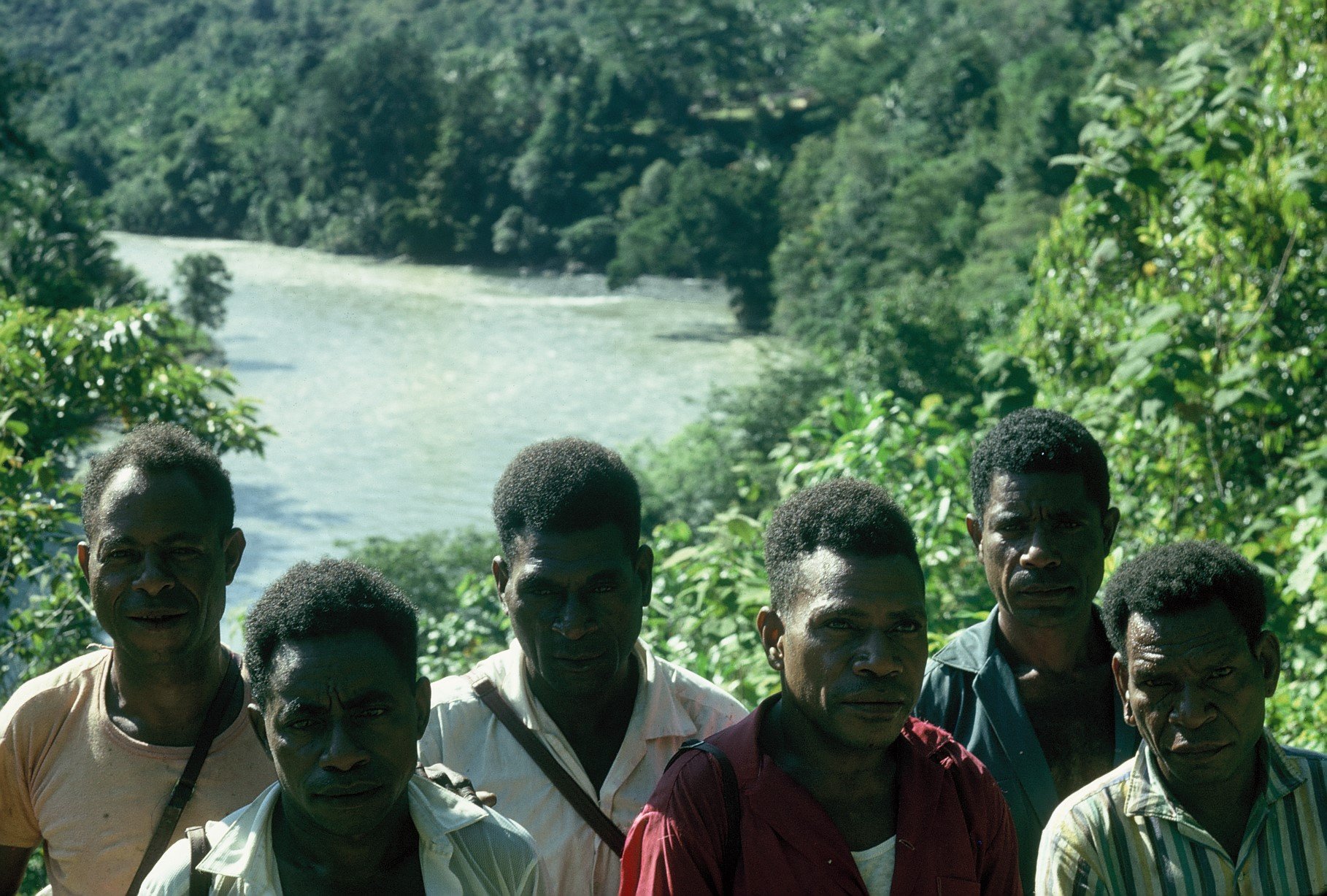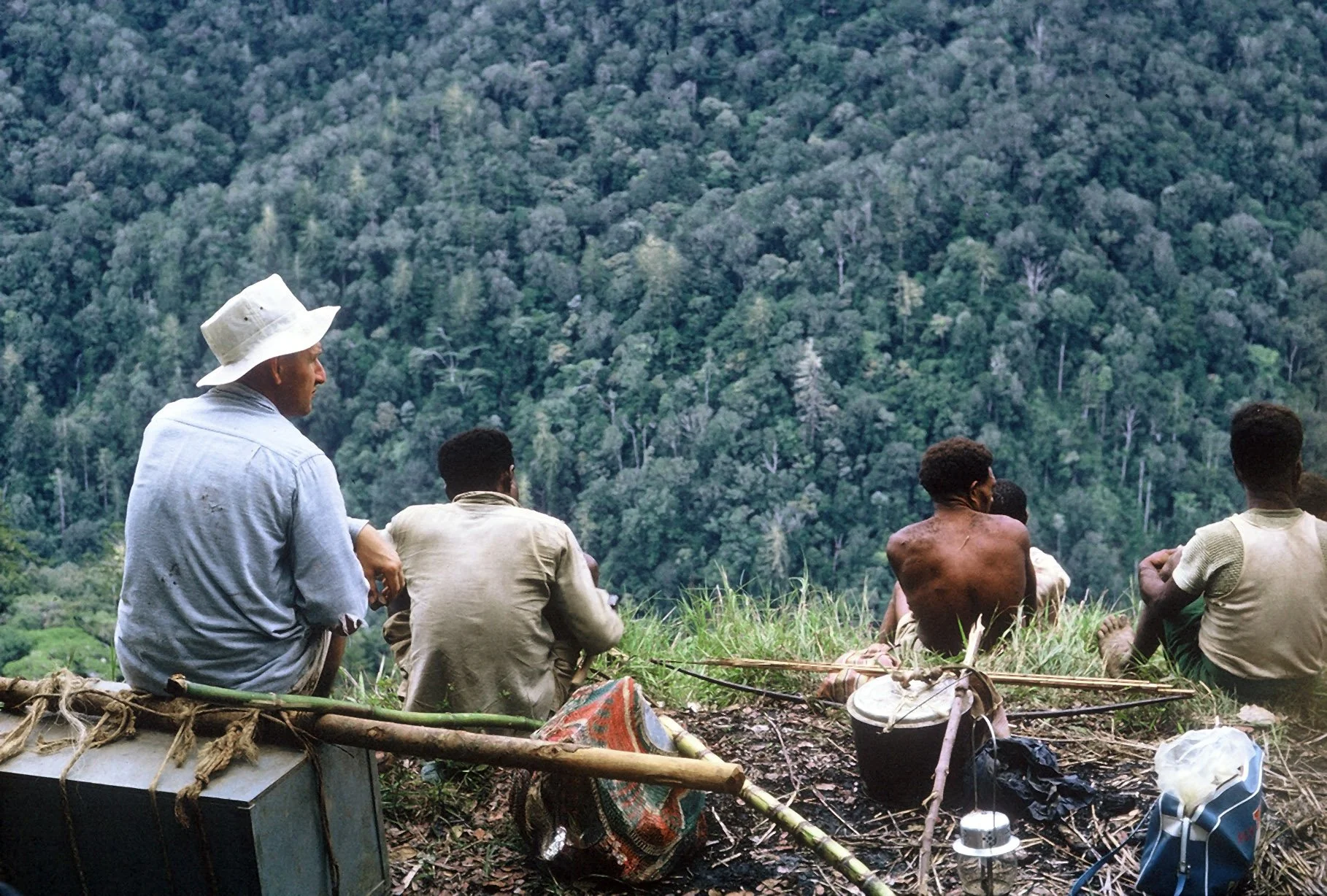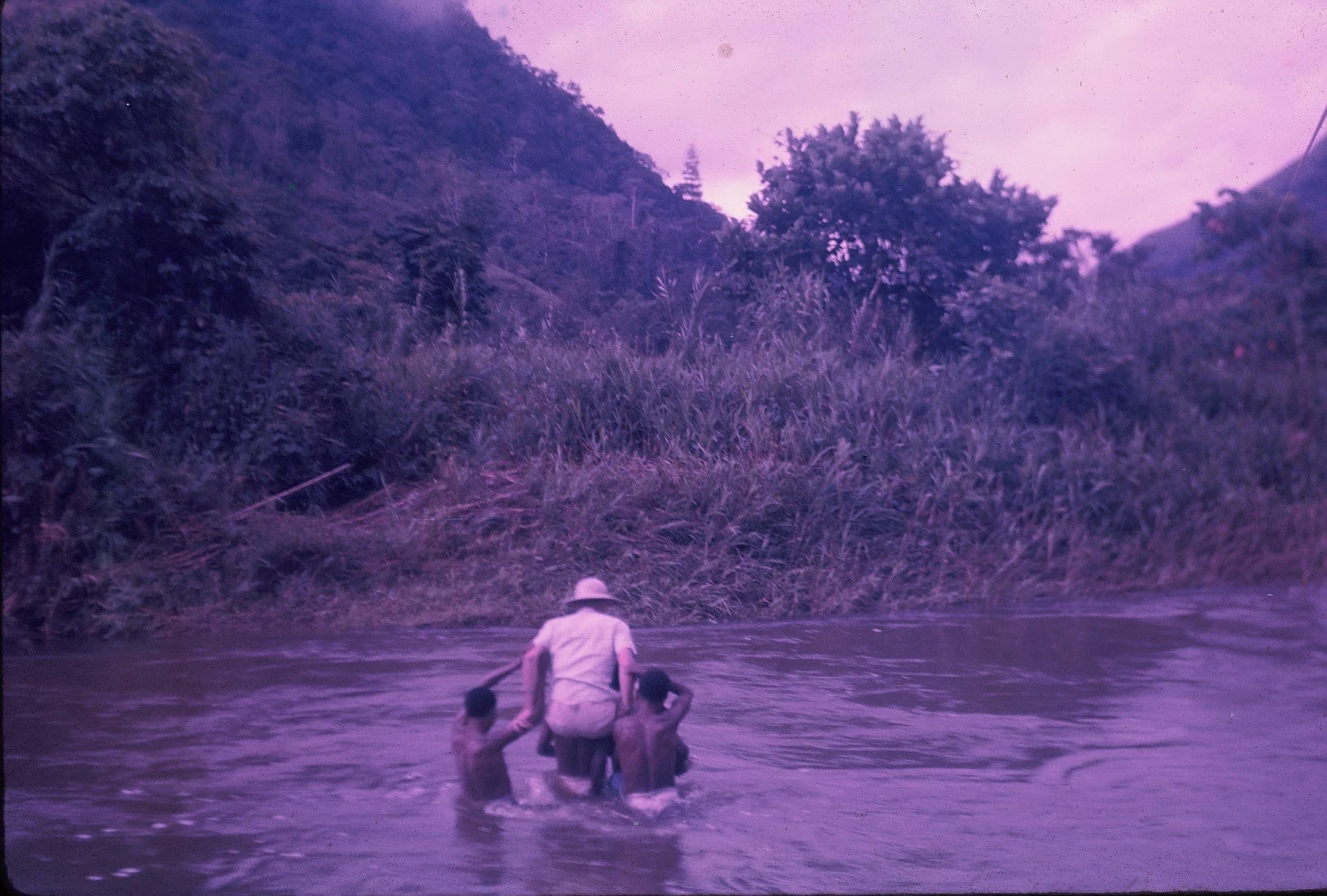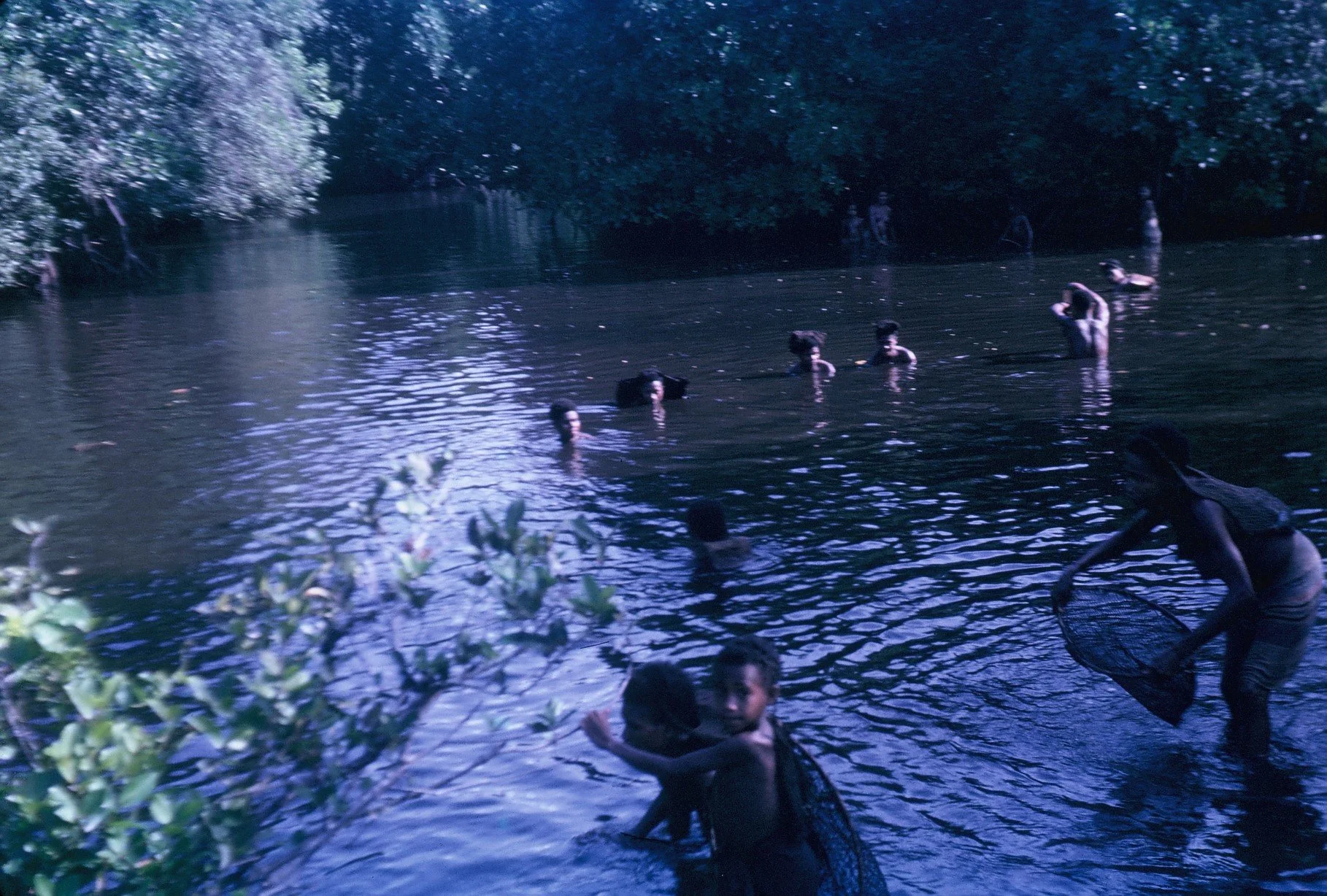Packing for Al’s bush trip
This photo from Paul Senff collection but can see similar carriers that accompanied Missionaries in PNG
1963 January
Written by Ina Erickson
Dear beloved friends,
First of all I wish to thank you for all of your Christmas greetings, cards, pictures and letters. We do appreciate the faithful friends that pray for us daily. I thought some of you might be interested in knowing what Al takes with him when he is going on a trip into the bush.
The people from the first village he is going to visit, send down four or five carriers that will carry ‘him to the mountains.’ What they actually do is carry his ‘Wabi’ or cargo. We have large rucksacks made of canvas with leather straps that they can carry on their back’s. I usually manage to fill four of them before I finally get them off. The first one, is usually filled with food. He gets some food from the natives, but one can’t always count on it and -(the restaurants along the way aren’t very good). So I pack enough food to last one, two or three weeks that he will be gone.
He has a camping outfit that his mother and father gave him before we left the states that really has been wonderful to have. It is a large kettle that has a heavy lid with a detachable handle that can also be used for a frying pan, a smaller kettle -about a quart size, and a coffee pot. It also has tin plates. I include a set of knives spoons and forks that all hook together, some cups, usually plastic, a couple of cereal bowls, some large tablespoons, and a sharp cutting knife. He needs a couple of dish towels, dish cloths, soap and dish pan also. Matches of course are a must, but each village furnishings him with firewood, and a cook and a bottle washer. This used to be a problem, but now so many of the girls have worked as house girls for Europeans. (all white people are called Europeans or bomboms) so they have some idea how to cook palatable food. New Guineans not noted for their excellence in food. Food is a necessity for existence not a luxury to be enjoyed. I include powdered milk, sugar, salt, pepper, butter, jelly, cereal as they are usually in a hurry to get going in the morning to another village. I put in tins of meat (that’s Australian for anything that is in a tin can) as meat is rare in the New Guinean diet, so they don’t have any extra to give to ‘Bingsu’. I also include some cans of pork and beans, packaged dried soups, tins of cheese and peanut butter. When he goes down to the coast, I include some potatoes and or rice, as they usually don’t have much food to spare. In the villages sometimes they give them a chicken or some taro which Al actually likes it. I have a hard time getting taro down. The coastal villages sometimes will have fish from a catch to give him. If they have a feast such as celebrating communion, baptisms or marriages they have killed a pig and they will give him some of that. All of the meat is boiled. Once Al sent home some pork that had been boiled in a green bamboo stick and it really tasted good. But mostly he hast to rely on what I have sent with him. Bread only keeps for a few days so I have to toast the bread. I toast two or three loaves in the oven until it is very hard. If it is dry it will keep for several weeks. How he can stay on dry bread I don’t know, but food doesn’t seem very important to him on his trips. He doesn’t like to eat too much differently than the others that are traveling with him. We discovered a food supplement that the Australians use, when Tommy was having such a bad time tolerating food, called Milo milk. It has all the necessary vitamins and minerals. We mix it with hot milk or powdered milk and hot water and have a delicious malt drink. So instead of coffee and tea, I sent him some Milo for his trip. That should fill about two rucksacks. Then he has to have one of clothes. He also needs a towel, washcloth, soap, toothbrush, razor and mirror, and comb. He usually baths in a nearby stream. Luckily, most villages are built near a stream for water supply, So I also include a bathing suit.
The enormous rainfall in PNG make it difficult to maintain bridges. But if the area is not developed there are few bridges so everyone crosses right through the streams and rivers.
Then the usual under clothes and wool socks for hiking as they absorb the water better when walking through streams and rivers. They don’t feel so cold and soggy, and don’t wrinkle, causing sore feet as cotton ones do. He wears tennis shoes instead of the heavy shoes with cleats, the older missionaries used to wear. It is hard enough to drag oneself up and down mountains without dragging a lot of extra weight along. When I asked Paula (2 ½) where daddy is, she always tells me ‘daddy go up and down the mount’. Truer words were never spoken. Then he must have a jacket for the mountains and flannel pajamas for the cool night air when it gets pretty cold, long sleeve shirts, handkerchiefs and one long pair of pants of, course, for the meetings. Included is the Jabem Bible, song book and Jabem book of Bible stories are included. He likes to have an English Bible and a good mystery for a few minutes of relaxing before he goes to sleep at night. That fills the third rucksack. Aren’t you glad you don’t have to carry it up and down the mountains?
Bushtrip with friend Vince Fricke in Jan 1964.
The last rucksack has his sleeping bag, air mattress, and mosquito net in it plus kerosene for the lamp, some matches, or tins of fish to give the carriers as gifts. There isn’t any pay, as this is one of the ways New Guineans have to contributing to the spreading of the gospel. Al usually comes home with cockroaches, termites and big black ants in his socks that he picks up along the way. They often give him oranges, cucumbers and potatoes which they raise to sell but they don’t eat them themselves.
He wears a helmet all of the time and has a raincoat handy as it has been known to rain even if we have been a bit short on it for just now. The road is a bit more difficult when it is wet. A walkingstick helps the progress a lot. So at last I have him off.
Oops! I forgot the cookies, and the candy bars he needs for added energy.
Sometimes they would carry the missionary across the rivers
We were warned when he first arrived not to try and live like the natives do as our constitution’s just can’t take it. The natives understand this so don’t expect us to try. We do try to live simply, but coming from a society like ours, living simply, is still complex. The weather has been quite hot even for New Guinea. We really are looking forward to a cooler rainy season. We feel so much more at home in our new environment as the months pass, though we are looking forward to the day when we will return to the United States. We look forward to having a chance to sit down and have a nice long talk with many of you. God‘s blessings to you all. Thank you again for being so generous with your letters, thoughts, cards, gifts and most of all your prayers. Love in his name.
Pastor Al, Ina, Paula and Tommy.
The following letter is undated and I suspect it was written in 1964 but this gives a glimpse into being on a bushtrip and what it entails:
From Pilemon from Alvin about a bushtrip
Dear Greg and Vicki, (Alvin’s niece and nephew)
Hi from the top of a cold mountain. I’m sleeping in a teachers house tonight. The floor is made of bamboo slats, so there are plenty of wide spaces between the bamboo. At my feet is a fireplace which I’m not going to use because of all the smoke and besides my sleeping bag does one pretty well. From here you can almost see the sea although this is the fourth mountain we have climbed since leaving the coast so we’re probably 30 miles inland. Tomorrow it’s down and down till we hit hot climate again in a village with coconuts.
Typical floor in a bush house.
Seven New Guinea men are with me and we are visiting all the villages in this area. In several villages, the people killed a pig for us to eat. There are no roads here so the only visitors that people get are those who walk in.
As usual the people are quite friendly, and we have had some good discussions. They have given me bananas, sweet potatoes, corn, pineapple, onions, and tomatoes so I’ve not gone hungry. I’m sure you would enjoy coming with me on a trip like this. It’s a very easy to sweat here in New Guinea and this makes it a little cooler. The jungle, Rushing, rivers, and big mountains are very scenic. We usually take a bath in a stream at the end of the day
I have visited all the schools to see if the children are learning to read it right. Most of all, I’m interested to hear what they know about our Lord Jesus. The people here are very poor, but many know that they’re real help in Christ. He alone cares for them at all times. Many men from this area have left their villages and have gone to teach the gospel to the heathen people who are still visiting each other.
How are you doing in school? We hope you like your teacher and are learning a lot. Paula, Tommy and Kristi would surely like to see you and your mom and dad. Did you get some of the shells we sent? Some of them could be cut and polished if you had the right kind of saw and buffer.
Just before I left Malalo I had a few close calls with snakes. One was curled at the door of our bathhouse, and when I came to unlock the door, it was only about 6 inches away from my foot. By the mercy of God, he did not strike, but a slight noise made me step back and then I saw him with my flashlight….. the next page is missing.









